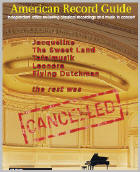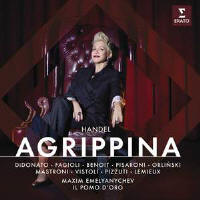Texte paru dans: / Appeared in: |
|
|
Outil de traduction ~ (Très approximatif) |
|
|
Reviewer: Ralph
Locke Wow, another marvelous recording of a once–forgotten Handel opera! And Agrippina (1709) is not "just another" Handel opera but a pathbreaking work: one of Handel's earliest (1709: he was 24!). Agrippina was composed the largest of Venice's eight opera houses (San Giovanni Grisostomo), which had five tiers of boxes and some 1400 seats—less than a third the capacity of today's Met. Lucky
singers to perform in such an
intimate space! The one surviving review (in a London newspaper) described
the music as "the best that ever was heard" in an opera. Right on! The
libretto is also among the best that Handel ever set; it was probably
written by Cardinal Grimani (co–owner of the theater). The superb booklet essay by Handel authority David Vickers describes the plot as "a comedy of antiheroic characters with an unquenchable thirst for political and sexual power". The two most positive figures are Poppea (seen here earlier in her politico–amorous career than in Monteverdi's Incoronazione) and Ottone (Otho), the heroic soldier whom she loves and, at the opera's end, will marry. Agrippina (sister of the famously crazed Caligula) tries to clear a path to the throne for her son Nero. In the process, she manipulates her husband Claudio (the Roman conqueror of Britain) and three men in his employ: the freedmen Pallante and Narciso and the servant Lesbo. At the end of the opera, Agrippina is briefly caught in the web of intrigue she herself has spun, but manages to get Claudio to believe that all her actions were out of loyalty to him. My condensed summary omits some moments imbued with comedy and social criticism, such as the extended scene in Act 3 where Ottone, Narciso, and Claudio arrive one by one, each awaiting a secret assignation with Poppea. She hides them in three separate closets, then reveals their presence to witnesses. The recitatives (perhaps somewhat trimmed here) communicate the tortuous goings–on efficiently, setting up the real meat: dozens of mostly short arias plus a few duets and larger ensembles. One delectable quartet for Agrippina, Nero, and the two freedmen lasts a neat 40 seconds. The arias are immensely varied in mood and in instrumentation: some use violins in unison, others two solo recorders, yet others just continuo. The moods range from boastfulness (Claudio, in Act 1) to near despair (Agrippina, at the end of Act 2). Our index shows reviews of seven CD recordings and a DVD. Online dealers and Wikipedia reveal one further CD recording and four more DVDs. And this does not count performances available only through streaming. Performers in those previous recordings include such renowned figures as countertenors David Daniels, Philippe Jaroussky, Bejun Mehta, Drew Minter, and Derek Lee Ragin and sopranos Veronique Gens and Danielle de Niese, under such conductors as Gardiner, Jacobs, Junghänel, Malgoire, and Ostman. I have only briefly sampled some of them. But, after listening to this newest recording, with Joyce DiDonato and three virtuosic countertenors, I can confidently assert that, though some of those renderings may perhaps be as good, none surpasses it.
the first production (that is lost) but five style–appropriate dance numbers that were found bound in with the autograph manuscript of Rodrigo (composed two years earlier). Some readers may have been lucky enough to catch the Met's recent production of Agrippina, starring DiDonato. If so, they will readily remember that the roles of Ottone (the good guy) and Narciso (a fop) were taken by excellent countertenors, and the teenaged Nero (the future Emperor, already utterly crazed and self–obsessed) was played to the hilt by a swaggering Kate Lindsey (mezzo–soprano). By contrast, the opera's original production had castratos as Narciso and Nero but a female mezzo or contralto as the brave, principled Ottone. Here we have countertenors in all three roles. This may encourage or deter potential purchasers. Some people can't abide seeing, or even just hearing, a woman in a male role (though Handel and his audiences were happy with it). Others find countertenor singing, even at its best, too limited for the expressive range and contrasts of Handel's music. But all three countertenors here are among the best currently active. The three (male) roles assigned to them are superbly well handled. Carlo Vistoli, least familiar of the three, imbues his exquisite soft high notes with a degree of self–satisfaction appropriate to Narciso. The character's very name evokes the mythological figure (son of a river god and a nymph) who admired to excess his image in a flowing stream. Jakub Jozef Orlinski's Ottone enhances his already–stellar reputation. In 'Lusinghiera mia speranza' (Act 1, scene 13), he varies the melody imaginatively on the repeat, to keen effect. But—a tiny gripe—the effects are so carefully rehearsed that they lack the illusion of spontaneity. Franco Fagioli is attention–getting here as Nero, but he lets the character's franticness spoil his vocal delivery: notes are often spitted out fast but without a clear, full core to the sound, thereby depriving us of a firm sense of pitch. All the singers project the specific intent of the words with precision and variety, and none of them forces the voice into ugliness.
Joyce DiDonato is masterly, and Elsa Benoit shows Poppea's ability to learn from Agrippina as the opera moves along, gradually trading sensitive sweetness for something much more canny and varied. The result of all this vocal and histrionic expertise is that, once one knows the bare bones of the plot, one can sense a lot of the action from the aural evidence alone. And, because the recording was made under studio conditions, much attention could be given to ensuring perfect intonation (even Fagioli is never off–pitch) and rhythmic coordination. The low–voiced males also do well, and with voices appropriate to their roles. The conniving Lesbo is smooth as silk. Agrippina's heroic, devoted husband Claudio is played by Luca Pisaroni, whose sound is deeper and (by this point in his career) a little rough in production—not much, just enough to suggest the careworn character of the military general that he is. (He doesn't quite command the lowest notes.) The orchestra (mainly Italians) is colourful and vivid, presenting highly contrasted moods for each aria or ensemble. The players show excellent unity of intent and are beautifully in tune. Balances are excellent, in the orchestra and between the orchestra and the singers. The recording was made in the Mahler Hall in the town of Dobbiaco, which is in the Italian Tyrol. In 2000 the hall was constructed inside a former hotel. (Dobbiaco—Toblach in German— is where Mahler composed Das Lied von der Erde.)
Are you the kind of listener
who uses music as background to your daily routine? I often do this and have
learned that highly dramatic and incisive performances, such as we find
here, are too distracting. But if you're looking for a sharply profiled
reading of one of Handel's richest and most varied operas, this new
recording will give near–endless pleasure. | |
|
|
|
|
Cliquez l'un ou l'autre
bouton pour découvrir bien d'autres critiques de CD |
|




